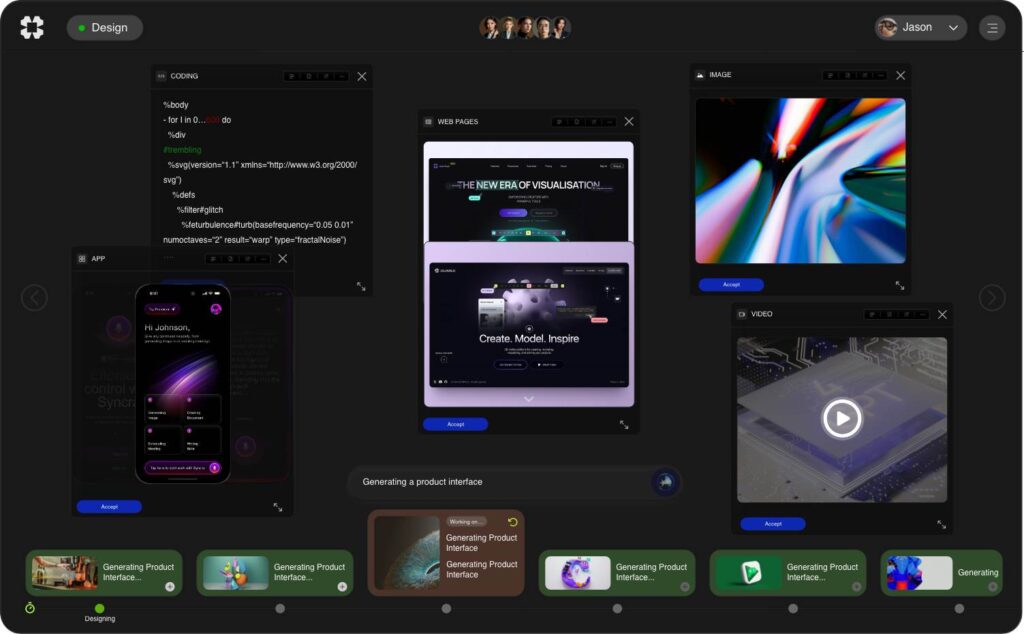Artificial Intelligence (AI) has transitioned from a buzzword to an essential component within various sectors, redefining workflows, enhancing productivity, and enabling businesses to make strategic decisions. As organizations increasingly adopt AI technologies, understanding its role in task management and orchestration is vital. This article delves into how AI integration, task management, and task orchestration are reshaping the workplace landscape by exploring current trends, industry applications, and valuable insights into their operational benefits.
.
**AI Integration: Streamlining Work Processes Across Industries**
AI integration refers to the incorporation of artificial intelligence technologies into existing systems and operations. This foundational step can significantly enhance productivity by automating routine tasks, allowing employees to focus on more strategic initiatives.
In industries such as healthcare, for example, AI integration has proven revolutionary. Healthcare providers are utilizing AI to analyze patient data rapidly, predict potential health risks, and offer personalized treatment recommendations. According to a report by Accenture, AI integration within healthcare could save the sector up to $150 billion annually by 2026, demonstrating the financial and operational benefits of leveraging AI technologies.
The retail sector is also witnessing profound AI integration. Companies like Amazon use machine learning algorithms to optimize inventory management, predict customer preferences, and personalize marketing strategies. By analyzing vast amounts of consumer data, AI can enhance customer experience while significantly reducing operational costs.
.
**AI Task Management: Empowering Teams for Enhanced Efficiency**
Task management has traditionally been a manual process that involves assigning tasks, tracking progress, and ensuring that teams meet their deadlines. With the introduction of AI-driven task management systems, organizations are witnessing a dramatic transformation in how tasks are handled.
AI task management tools leverage machine learning to understand team dynamics, assess workloads, and prioritize tasks based on available resources. For instance, platforms like Asana and Trello are integrating AI features that help project managers allocate tasks more efficiently, foresee potential bottlenecks, and offer recommendations for optimal task assignment.
One groundbreaking example of AI task management is Robotic Process Automation (RPA), where AI is used to automate repetitive tasks such as data entry or report generation. A study conducted by Deloitte found that organizations implementing RPA witnessed a 30% increase in productivity within the first year of adoption. This allows employees to focus on creative and high-impact tasks, fostering a more innovative workplace.
.
**AI Task Orchestration: Facilitating Complex Operations**
AI task orchestration takes AI-based task management a step further. It involves coordinating multiple automated tasks in a seamless manner in order to achieve complex objectives. Task orchestration ensures that disparate tasks across teams or departments operate in a synchronized manner.
In supply chain management, for instance, AI task orchestration can dramatically improve efficiency. AI systems can synchronize the ordering, shipping, and inventory management processes, allowing businesses to reduce lead times and minimize stock outages. Companies such as Walmart have embraced AI orchestration to optimize their logistics, resulting in significant cost savings and improved delivery times.
In manufacturing, AI task orchestration seamlessly integrates with automation systems to monitor production lines, predict maintenance needs, and manage inventory levels. Siemens, a leader in industrial automation, utilizes AI orchestration to improve operational efficiency dramatically. By employing AI to orchestrate workflows, they have managed to reduce downtime by 20%, showcasing the potential of AI in traditional operational environments.
.
**Emerging Trends in AI Integration and Orchestration**
As businesses across various sectors increasingly recognize the potential of AI, several trends are emerging:
1. **Unified AI Platforms:** Organizations are shifting towards holistic AI platforms that integrate task management, orchestration, and analytics under one umbrella. This consolidation enables better collaboration, improved data sharing, and enhanced decision-making capabilities.
2. **Collaboration Between Humans and AI:** The future of AI integration emphasizes a collaborative approach, where AI systems augment human capabilities rather than replace them. Tools that harmonize human creativity with AI efficiency are gaining traction as businesses recognize the value of both elements.
3. **Personalization through AI:** Customization is becoming a significant trend, particularly in customer-facing industries. AI models that analyze user behavior and preferences are helping companies deliver unique experiences to their customers.
4. **Continuous Learning and Adaptation:** The development of self-learning algorithms allows AI systems to continuously improve their recommendations based on new data. This adaptability ensures that task management and orchestration processes stay relevant and efficient as business needs evolve.
.
**Industry Use Cases Showcasing AI’s Impact**
Numerous industries are implementing AI-driven task management and orchestration models with remarkable success:
– **Financial Services:** Financial institutions are leveraging AI for credit scoring, risk assessments, and fraud detection. AI-powered systems can analyze customer data and transaction patterns far quicker than human analysts, allowing instant decision-making.
– **Real Estate:** AI is rapidly transforming property management through predictive maintenance and automated tenant communication. By using AI systems to manage tasks, property managers can ensure better tenant satisfaction and lower operational costs.
– **Agriculture:** Precision agriculture is making strides thanks to AI task orchestration. Farmers employ AI-driven systems for irrigation management, crop health monitoring, and yield prediction. This leads to increased productivity and sustainable farming practices.
.
**Technical Insights: Building an Agile AI Task Management Environment**
The successful implementation of AI integration, task management, and orchestration requires organizations to consider several technical aspects:
1. **Data Quality:** AI systems rely heavily on data. Ensuring high-quality data collection and management practices is crucial for training accurate models.
2. **Interoperability:** Seamless communication between existing systems and AI tools is essential. Organizations should prioritize platforms that support interoperability to facilitate smooth data flow and integration.
3. **Scalability:** As AI applications evolve, organizations need scalable solutions that can adapt to growing operational needs without compromising performance.
4. **Security and Ethics:** Protecting user data and adhering to ethical considerations while implementing AI technologies is paramount. Organizations must establish governance and compliance frameworks to mitigate potential risks.
.
**Conclusion: Embracing AI for a Competitive Edge**
AI integration, task management, and orchestration are not just trends; they are the future of operational excellence across multiple industries. Organizations that embrace these technologies will not only enhance productivity but also position themselves as leaders in their respective markets. By understanding and implementing AI-driven solutions effectively, businesses can leverage these advancements to foster innovation, improve efficiency, and ultimately drive sustainable growth.
In a rapidly evolving landscape, staying ahead means embracing the future of work through AI integration and orchestration—transforming them from concepts into tangible realities that propel industries forward.
**Sources:**
1. Accenture: “How AI Can Help the Healthcare Sector.”
2. Deloitte: “The Automation Advantage.”
3. Walmart Corporate: “Annual Logistical Efficiencies Report.”
4. Siemens: “Future of Automation and Digitalization.”
5. Asana & Trello Official Websites: Product Features and Integrations.





















